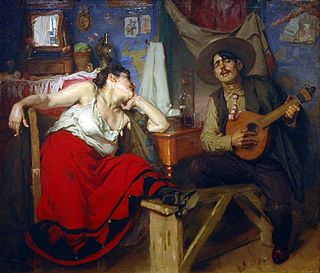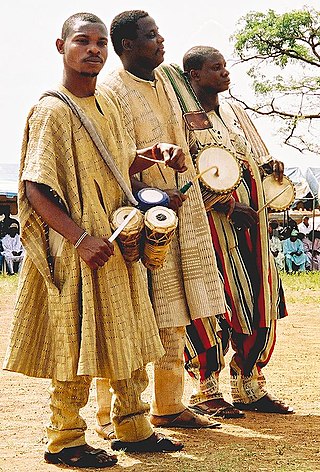
Afrobeat is a Nigerian music genre that involves the combination of West African musical styles from mainly Nigeria such as the traditional Yoruba and Igbo music and highlife with American funk, jazz, and soul influences. With a focus on chanted vocals, complex intersecting rhythms, and percussion. The style was pioneered in the 1960s by Nigerian multi-instrumentalist and bandleader Fela Kuti, who popularised it both within and outside Nigeria. At the height of his popularity, he was referred to as one of Africa's most "challenging and charismatic music performers."

Funk is a music genre that originated in African-American communities in the mid-1960s when musicians created a rhythmic, danceable new form of music through a mixture of various music genres that were popular among African-Americans in the mid-20th century. It deemphasizes melody and chord progressions and focuses on a strong rhythmic groove of a bassline played by an electric bassist and a drum part played by a percussionist, often at slower tempos than other popular music. Funk typically consists of a complex percussive groove with rhythm instruments playing interlocking grooves that create a "hypnotic" and "danceable" feel. It uses the same richly colored extended chords found in bebop jazz, such as minor chords with added sevenths and elevenths, and dominant seventh chords with altered ninths and thirteenths.
Given the vastness of the African continent, its music is diverse, with regions and nations having many distinct musical traditions. African music includes the genres makwaya, highlife, mbube, township music, jùjú, fuji, jaiva, afrobeat, afrofusion, mbalax, Congolese rumba, soukous, ndombolo, makossa, kizomba, taarab and others. African music also uses a large variety of instruments from all across the continent. The music and dance of the African diaspora, formed to varying degrees on African musical traditions, include American music like Dixieland jazz, blues, jazz, and many Caribbean genres, such as calypso and soca. Latin American music genres such as cumbia, salsa music, son cubano, rumba, conga, bomba, samba and zouk were founded on the music of enslaved Africans, and have in turn influenced African popular music.

A singer-songwriter is a musician who writes, composes, and performs their own musical material, including lyrics and melodies. In the United States, the category is built on the folk-acoustic tradition with a guitar, although this role has transmuted through different eras of popular music. Traditionally, these musicians would write and sing songs personal to them. Singer-songwriters often provide the sole musical accompaniment to an entire song. The piano is also an instrument of choice.

Fado is a music genre which can be traced to the 1820s in Lisbon, Portugal, but probably has much earlier origins. Fado historian and scholar Rui Vieira Nery states that "the only reliable information on the history of fado was orally transmitted and goes back to the 1820s and 1830s at best. But even that information was frequently modified within the generational transmission process that made it reach us today."

The music of Brazil encompasses various regional musical styles influenced by European, American, African and Amerindian forms. Brazilian music developed some unique and original styles such as forró, repente, coco de roda, axé, sertanejo, samba, bossa nova, MPB, gaucho music, pagode, tropicália, choro, maracatu, embolada, frevo, brega, modinha and Brazilian versions of foreign musical styles, such as rock, pop music, soul, hip-hop, disco music, country music, ambient, industrial and psychedelic music, rap, classical music, fado, and gospel.
Melisma is the singing of a single syllable of text while moving between several different notes in succession. Music sung in this style is referred to as melismatic, as opposed to syllabic, in which each syllable of text is matched to a single note. An informal term for melisma is a vocal run. The term roulade is also sometimes used interchangeably with melisma.

The music of Nigeria includes many kinds of folk and popular music. Little of the country's music history prior to European contact has been preserved, although bronze carvings dating back to the 16th and 17th centuries have been found depicting musicians and their instruments. The country's most internationally renowned genres are Indigenous, Apala, Aurrebbe music, Rara music, Were music, Ogene, Fuji, Jùjú, Afrobeat, Afrobeats, Igbo highlife, Afro-juju, Waka, Igbo rap, Gospel,Nigerian pop and Yo-pop. Styles of folk music are related to the over 250 ethnic groups in the country, each with their own techniques, instruments, and songs. The largest ethnic groups are the Igbo, Hausa and Yoruba. Traditional music from Nigeria and throughout Africa is often functional; in other words, it is performed to mark a ritual such as the wedding or funeral and not to achieve artistic goals. Although some Nigerians, especially children and the elderly, play instruments for their own amusement, solo performance is otherwise rare. Music is closely linked to agriculture, and there are restrictions on, for example, which instruments can be played during different parts of the planting season.
Manitoba has produced much Canadian music, especially since the early 1960s.

Islamic music may refer to religious music, as performed in Islamic public services or private devotions, or more generally to musical traditions of the Muslim world. The heartland of Islam is the Middle East, North Africa, the Horn of Africa, Balkans, and West Africa, Iran, Central Asia, and South Asia. Due to Islam being a multi-ethnic religion, the musical expression of its adherents is vastly diverse. Indigenous traditions of various part have influenced the musical styles popular among Muslims today. The word "music" in Arabic, the language of Islam, is defined more narrowly than in English or some other languages, and "its concept" was at least originally "reserved for secular art music; separate names and concepts belonged to folk songs and to religious chants".
Fújì is a popular Yoruba musical genre. It arose from the improvisational wéré music, also known as ajísari, a genre of music performed to wake Muslims before dawn during the Ramadan fasting season. Alhaji Sikiru Ayinde Barrister popularized wéré music during the 1950s and 60s and conceived the term "fújì" in an unusual way. According to Barrister, "I came up with it when I saw a poster at an airport, advertising the Mount Fuji, which is the highest peak in Japan." Fújì should not be mistaken for the Yorùbá words "fuja" or "faaji," which mean leisure or enjoyment.
Jùjú is a style of Yoruba popular music, derived from traditional Yoruba percussion. The name juju from the Yoruba word "juju" or "jiju" meaning "throwing" or "something being thrown". Juju music did not derive its name from juju, which is a form of magic and the use of magic objects, common in West Africa, Haiti, Cuba and other South American nations. It evolved in the 1900s in urban clubs across the countries, and was believed to have been created by Ababababaa Babatunde King, popularly known as Tunde King. The first jùjú recordings were by King and Ojoge Daniel in the 1920s, when King pioneered it. The lead and predominant instrument of jùjú is the Iya Ilu, talking drum.
Salawa Abeni Alidu is a Nigerian singer. An Ijebu Yoruba from Ijebu Waterside, in Ogun State, she began her professional career in waka music when she released her debut album titled, Late General Murtala Ramat Mohammed, in 1976, on Leader Records. It became the first recording by a female artist in Yoruba Songs to sell over a million copies in Nigeria.

Yoruba music is the pattern/style of music practiced by the Yoruba people of Nigeria, Togo, and Benin. It is perhaps best known for its extremely advanced drumming tradition and techniques, especially using the gongon hourglass shape tension drums. Yoruba folk music became perhaps the most prominent kind of West African music in Afro-Latin and Caribbean musical styles; it left an especially important influence on the music used in Santería practice and the music of Cuba.
Waka music is a popular Islamic-oriented Yoruba musical genre. It was made popular by Alhaja Batile Alake from Ijebu, who took the genre into the mainstream Nigerian music by playing it at concerts and parties; also, she was the first waka singer to record an album. Later, younger singers like Salawa Abeni and Kuburatu Alaragbo joined the pack. In 1992, Salawa Abeni was crowned "Queen of Waka" by the Alafin of Oyo, Oba Lamidi Adeyemi.
General Ayinla Kollington, born Abdulrasaq Kolawole Ilori to Chief Ayanda Ilori, a Kingmaker and Alhaja Asiawu Mofodeke Ilori. He is a Nigerian Fuji musician and one of the pioneers of the genre. He hailed from Ilota, a Town on the outskirt of Ilorin, Kwara State, Nigeria. He is also called Baba Alatika, Kebe-n-Kwara, Baba Alagbado.
Oríkì, or praise poetry, is a cultural phenomenon amongst Yoruba-speakers of West Africa.

Rumba is a secular genre of Cuban music involving dance, percussion, and song. It originated in the northern regions of Cuba, mainly in urban Havana and Matanzas, during the late 19th century. It is based on African music and dance traditions, namely Abakuá and yuka, as well as the Spanish-based coros de clave. According to Argeliers León, rumba is one of the major "genre complexes" of Cuban music, and the term rumba complex is now commonly used by musicologists. This complex encompasses the three traditional forms of rumba, as well as their contemporary derivatives and other minor styles.

Debbie Klein is an American anthropologist and social justice advocate. She is a professor in the Anthropology Department at Gavilan College. Since 1990, Klein has been conducting extensive collaborative research in Nigeria with Yorùbá performing artists. Recognizing Klein's decades of collaborative written and video documentation of Yorùbá culture, the town of Èrìn-Òșùn, Nigeria bestowed an honorary chieftaincy title, Iyalode of Èrìn-Òșùn, upon Klein alongside her long-term mentor and collaborator, Chief Làmídì Àyánkúnlé. Throughout her career, Klein has advocated at local, state, national, and international levels for increased investment in public education as a means to achieve social and economic justice.










